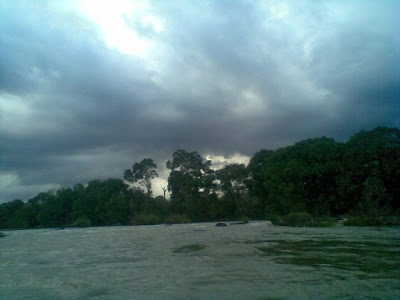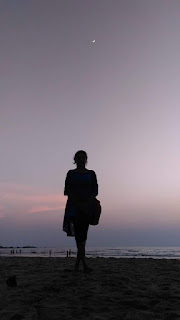a trip to heaven, quite literally
 Majority of India goes away on a vacation
in the scorching month of May. Places like Kashmir, Himachal Pradesh, Goa and Kerala
are the most visited and top the list of best
vacation destinations. But last year, not only did I choose an off-season
time, but also an offbeat place.
Majority of India goes away on a vacation
in the scorching month of May. Places like Kashmir, Himachal Pradesh, Goa and Kerala
are the most visited and top the list of best
vacation destinations. But last year, not only did I choose an off-season
time, but also an offbeat place.
Leave alone the phirangs; in my opinion, even most Indians are not aware of this
little heaven in the middle of Karnataka state called Coorg. I heard about
Coorg for the first time from my Kannada friend
a few years back. It stayed sleeping in the back of my mind only to surface
last November when my dad asked me, where in south can we travel?’ As we had
already covered the obvious ‘Mysore-Ooty-Bangalore’ trip, ‘Coorg’ instantly
came to my mind.
So off we were, first to Bangalore to visit
my sister and then to Coorg. One can reach this eerily tranquil place by train,
getting down at Mysore or Hassan railway station, or by plane
at Mangalore and taking the local buses to Madikeri, the capital of Coorg. But for
me the best route was a road trip from Bangalore along the Mysore highway to
Madikeri. There are several private tourism companies in Bangalore that will
provide you with a vehicle, a driver and an itinerary at a reasonable cost. Throw
away the itinerary and take the rest because you will realize as you start your
trip, the more you stay there, the more you want to be there.
The southern clouds have always seemed very
dramatic to me and the sugarcane fields with tamarind trees that run along the
road after passing Mysore, make it look like as if it just popped out of some
17th century painting. The famous ‘Ramgarh’
village of iconic Bollywood film ‘Sholay’
also lays on the way and your driver-cum guide will be prompt to point it out,
it’s a matter of great pride for a state that has its own separate film
industry.
Coorg or ‘Kodagu’
as it was called in earlier days, literally means ‘a dense forest in steep hills’, hence the weather is pleasant or rather
chilled all round the year. Being close to equator the rains are unpredictable
and leave the place looking unworldly beautiful and romantic. If you happen to
visit in the month of September, you get a bonus of witnessing the ‘Kailpodhu festival’, celebrated on 3rd
September. It signifies the completion of rice crop transplantation. Kail means weapon and Podhu means festival. Thus the
festival is celebrated with great zeal and consists of several sports that
require the men to exhibit their physical strength. This festival makes for
some vividly colourful and spontaneous pictures; unfortunately I could only get
a glimpse of it in the tourist booklet.
The Coorgis
or the Kodavas are said to be the
descendants of Alexander the Great, when his troops invaded India somewhere
around 327 BC. Perhaps, that should explain their unique Greek-ish physical
features like the well-built men and exotic beauties with chiseled faces such
as Miss World ‘Aishwarya Rai’.
On the first day we visited the ‘Namdroling’ Buddhist monastery at ‘Byalukuppe, closer to Mysore district. The moment you enter
its premises you forget that you are in south India; instead it feels like
north east. Housing nearly 5000 monks and nuns who are
the descendents of Tibetian
exiles who settled here in 1963, Ngagyur Nyingma Institute (Shedra)
(Higher Buddhist Studies and Research Center), is the largest
teaching centre in the world of ‘Nyingmapa’, a lineage of Tibetan
Buddhism. The bang of gigantic; metal drums, metal bells, metal
plates and wooden muyu along with the
constant chanting of hymns take you in a trance and sooth your soul instantly. The
main temple called ‘Golden Temple’ is
a huge hall that roofs the 60 ft tall golden statue of Lord Buddha, surrounded
by two other statues of Lord Padmasambhava and Lord Amitayus, each 58 ft
in height. The statues are adorned by enormous china ware and heaps of
brilliantly and coloured flowers. The walls are covered with vivid paintings of
Buddhist mythology and characters. Outside the monastery the monks and students
earn their livelihood by selling several antiques and unique Buddhist stuff in
the well organised shopping alley. The good thing about them is, they are not
hard sellers and thus it makes shopping a pleasant experience for a change. I
bought the famous Buddhist bell, which is claimed to be made by an alloy of 5
metals and produces a soothing sound on being rubbed by a wooden stick. One
thing you will notice without fail is that, in spite of all the activity the
monastery seems calmingly quiet.
Next up was the 70ft tall ‘Abbi Falls’. Coorg as a
vacation spot has not yet been trampled by reckless tourism and its natives,
the descendents of Alexander the Great, live very close to the laws of nature,
thus keeping the authenticity of the place and its biodiversity very much
intact. Abbi Falls is a great example of this and a best
place for bird watching and simply relaxing in the thick green forest that
surrounds it. The pin drop silence enables you to hear the birds and the
gushing water as if they whispered in your ears. You have to fight your urge to
plunge into the milk white waters as swimming is strictly prohibited here.
Another water spot in Coorg are the
pilgrimages; ‘Talacauveri’ a temple
at the origin of the southern Ganges – river ‘Cauvery’ and ‘Bhagmandala’ the confluence of Cauvery with its tributaries, the Kannike and the mythical Sujyoti river. Here you
can awe several intrinsically carved wooden and stone temples, depicting the
Hindu mythological events. The temples serve simple, vegetarian south Indian
lunch of Sāmbhar-rice and curd or
butter milk as Prasad. The Prasad is
a true blessing considering the exertion after swimming in the cool waters of
Cauvery.
The language in Coorg show heavy influence of
the British. The locals speak in Kanada
or Kodava, yet the official language
is English. Getting around the place is easy if you can speak English and
understand English that is coated with heavy south Indian accent. In my entire
stay at this immensely tranquil place the only fuss and ironically fun part was
communicating with my driver. Finally
after solving the funny confusions with him we decide to go to Dubbare Elephant Camp and end our day 1
in this blissful district. Watching the giants take an evening bath
and enjoy themselves with least consideration for their audience, fills your
heart up and urges you to plunge in too and give them a hug. If you are
adventurous enough you can very well do that; provided you can convince the
caretakers as the elephants are not a problem at all, but explaining the
caretakers is.
The next day was an early riser, as Nagarhole National Park consumes almost
half of your day. It consists of all major Asian spices of animals and birds.
If you have been to Mysore zoo, this place will be a repeat telecast except
that the animals here are less caged and have more free space to wander around.
Feeding the spotted deer and walking on the rough pathways shaded by dense
bamboo trees, creates a lasting print on your memory. It is certainly a must on
your list if you have kids along with you.
All though the eternal vibe of the place is
very quiet and tranquil, there is enough activity for people who need more
action. Don’t forget to visit the white water rafting in Barapole River,
fishing in Valnoor camp and trekking in the mountains of Madikeri, which is no
less than a confrontation with the tough and volatile nature. Within the
hauntingly silent and thick mountains of Madikeri, one finds himself so close
to nature and to himself that it is hard to believe a place like such exists.
The Coorgi cuisine also shows a heavy
influence of the British and Portuguese. Non-vegetarian food is easier to find here than compared to other
south Indian locations. Due to the river Cauvery it has more access to sweet
water fish than sea fish; hence pork and chicken remain its main delicacies. The
coal-roasted chicken at a very homely shack was the best lunch I had had in a
really long time. It was surrounded by nothing but only green mountains for
miles together, and in that silence of the valley I savoured the delicious food
as if there was no tomorrow . Being an Indian district, you will also find the
typical, religiously vegetarian population, thus vegetarian food also forefronts
the menu of many restaurants here.
We ended this blissfully verdant
journey at Raja Seat; a beautifully landscaped and huge garden, famous for its
Sunset point and musical fountains. In the olden days, as the name suggests it
was the hang out place for the kings and queens. The experience is extremely magical and you
are bound to fall in love, so make sure you plan this trip with the right
person, cause I certainly saw some sparks flying between my ‘married for 25 years’ parents.
I long to return to this
unrealistically calm place that has had such an effect on me that writing about
it alone as soothed every inch of my skin with a cool breeze from my memory in
this unexpectedly hot month of March.



Comments
Post a Comment